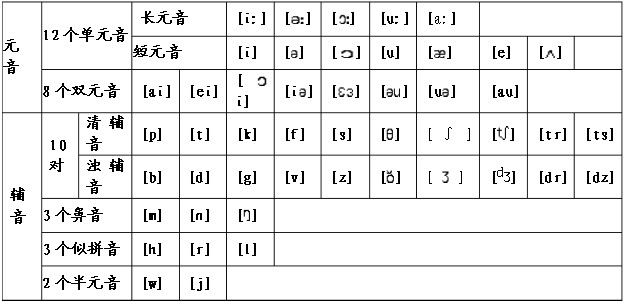本试题 “阅读下列应用文及相关信息,并按照要求匹配信息。请在答题卡上将对应题号的相应选项字母涂黑。以下是不同餐馆的说明:A.Rose GardenIt cozily stands beside...” 主要考查您对听力
语音
直接引语与间接引语
派生法
等考点的理解。关于这些考点您可以点击下面的选项卡查看详细档案。
- 听力
- 语音
- 直接引语与间接引语
- 派生法
听力题解题技巧:
1、听前预测:
(1)听前集中精力,全身放松,保持最佳的准备状态。
(2)认真阅读各个大题说明,以明确测试的内容、播读次数及答题方式。
(3)迅速阅读试卷上的文字信息,这些信息与录音材料有着密切的联系,可以提供录音所涉及的中心、时间、地点等。带着这些问题,积极主动地预测,可使自己处于主动地位,做到心中有数。
2、听中要诀:
(1)高度重视听好开头的句子或段落,这往往是谈话的中心。
(2)要注意整听。听的过程中,遇到个别词没听清(有可能是由于朗读技巧,如连读,弱读等造成的),这很正常,千万不要死死抓住不放,结果因小失大。要知道,几秒钟会读出几十个词语,而声音一旦消失,做题时肯定毫无依根据。正确的做法是毫不迟疑地跳过去,接着往下听,等录音放完后再凭记忆或依据上下文猜测。
(3)要留意重音。连贯的句子中,信息词(名词、动词、形容词等)在读的时候往往重读,精力放在这些词上便于把握重点。其实,想把每个词都听清楚是不可能的,也没必要。如下面对话时,只要听清加“′”的词即可。
M:′Where are the boys?
W:The boys went to the′concert.
M:Went to′what?
W:A′concert—they went to a′concert.
(4)适当记些笔记。一边听录音,一边随手记些笔记,特别是其中的数字,如日期、时间、年龄、距离或地点,最好记下来,增大回答问题的准确性。但要注意原则,笔记不能影响听音的继续,也不能繁琐凌乱。可用代号、图形或自己明了的其他方式进行记录,脑笔结合记忆。
3、听后补救:
如果某一题没有听懂原文,无法判断正确答案,一不要着急慌张,而不要放弃不答。要根据大脑当时对该部分的声音印象,结合全文,结合题目文字材料,大胆猜测。例如你当时好像听到含有[ɑī]的某个词,这时你就可以想想my,high,fly,sight,five等词的词义,词类是否符合原文语境。总之,三选一意味着你随便猜,也有33%的机率,岂能轻易放过?
听力题注意事项:
1、集中精力,放松精神。
学生在参加听力测试时要充满信心,稳定情绪,沉着应对,切勿情绪不稳,心神不定,因为它不同于笔试答卷。
2、超前阅读,去同存异。
利用答题前的时间和放录音时各小题短暂停顿,可快速浏览所提供选项,注意它们之间的不同之处。
3、静心倾听,快速选择。
学生在阅读选项时一听见播放下一题听力材料,须停止阅读,静心倾听录音,立刻进行选择。如果一时选不出,可以根据录音的大概意思,合理推测,注意千万不要为了一个难题而耽误后面的试题。
4、记录要点,有备无患。
听对话和短文时最好边听边记,用自己平时最熟悉的标记与符号,简单记录一下重要的信息。这样做有助于听力材料播放完毕后逐个小题的去解答,而且有助于回顾形式完整的对话或短文梗概,以备核对复查。
元音与辅音:
(1)元音发音时气流通过口腔时不受受任何阻碍,元音按发音时的嘴唇形状和舌头位置是否改变而分为单元音和双元音。
(2)辅音根据声带是否震动分为清辅音和浊辅音。
重读音节和重读闭音节:
(1)重读音节指在双音节或多音节词中有一个发音特别响亮的音节,叫重读音节,用重音符号“`”标于相应位置,其他音节为非重读音节,如begin |be'gin|,单音节词作重读处理,但不标重音符号。
(2)重读闭音节就是所谓的元音字母不是发它本身的字母音,重读闭音节就是指在一个音节中,以辅音因素结尾的而且是重读音节的音节比如apple划音节就因该是ap/ple前面那个ap是一个音节以辅音因素p结尾就是闭音节。
划分音节的方法:
1、元音是构成音节的主体,辅音是音节的分界线。两辅音之间不管有多少个元音,一般都是一个音节。
例如:bed 床,bet 打赌,seat 坐位,beat 毒打,beaut 极好的 beau'ty 美。
2、两元音字母之间有一个辅音字母时,辅音字母归后一音节。
例如:stu'dent 学生,la'bour 劳动。
3、有两个辅音字母时,一个辅音字母归前一音节,一个归后一音节。
例如:let'ter信,win'ter冬天。
4、不能拆分的字母组合按字母组合划分音节。
例如:fa'ther父亲,tea'cher 教师。
5、音节按读音可以分为开音节和闭音节,开音节又可以分为绝对开音节和相对开音节。
(1)绝对开音节:是指一个元音字母后面没有辅音字母而构成的音节。
例如:we, hi, yo-yo
(2)相对开音节:是指一个元音字母后面有一个辅音字母(除r)之外,最后是一个不发音的e构成的音节。
例如:take, make在开音节中,这个元音字母发“字母”本身音。
例如:hi |hai|, use |ju:z|
(3)闭音节:指元音字母后面有辅音字母(辅音字母r除外)构成的音节。
例如:leg, cross
48个国际音标表:

定义:
直接引语:直接引用别人的原话,并在原话前后加引号。
例:He said:" It is too late."
间接引语:用自己的话转述别人的话,多数以宾语从句的形式构成。
例:He said it was too late.
直接引语与间接引语的转换:
一、人称代词的变化:
直接引语变间接引语时,人称代词的变化一般规律是:
第一人称→第三人称;
第二人称→第一人称;
第三人称→第三人称。
简记为“二一、一三、三留”。
例:"I'm thinking of changing my address." he said.
→ He said that he was thinking of changing his address.(I和he指同一个人)
Xiao Ming asked me, "Are you going to the park with us?"
→ Xiao Ming asked me if I was going to the park with them.(us与them指相同的人,XiaoMing是其中的一员;me和you指同一个人)
Mr. Li said, "She will attend the meeting."
→ Mr. Li saidthatshewouldattendthemeeting.(Mr. Li和she不是同一个人) 但当说话者是第一人称,直接引语中的主语也是第一人称时,不作变化。
I said to my children, "I will give you some presents on Christmas Day."
→ I told my children I would give them some presents on Christmas Day. (I为同一说话者)
二、时态的变化:
直接引语变间接引语时,时态的变化规律是往“过去”相应的时态推移:
一般现在时→一般过去时,
一般将来时→过去将来时,
现在进行时→过去进行时,
现在完成时→过去完成时,
一般过去时/过去完成时→过去完成时。
如:My father told me, "He will come back next week."
→ My father told me that he would come back the next week.
She asked me, "Did you finish your homework?"
→ She asked me if I had finished my homework.
注意:直接引语属下列情况时,时态不作变化:
1、直接引语属真理或客观事实时:
如:The teacher said to us, "Light runs much faster than sound."
→ The teacher told us light runs much faster than sound.
2、主句谓语动词是现在或将来某个时态:
如:The old man often says, "I joined the Red Army when I was young."
→ The old man often says that he joined the Red Army when he was young.
3、直接引语带有具体的过去时间状语时:
如:The politics teacher said to us, "The party was founded in 1921."
→ The politics teacher told us that the party was founded in 1921.
4、直接引语谓语有情态动词:had better,would rather及need,must,oughtto等时:
如:He said to me, "I would rather live in the countryside."
→ He told me that he would rather live in the countryside.
5、直接引语为虚拟语气谓语时 e.g.Shesaid,"IwouldbehappyifIwereabird."→ Shesaidthatshewouldbehappyifshewereabird.
三、句型的变化:
直接引语变间接引语时,句型要作适当变化:
1、变陈述句为由that引导的从句(that常省略):
如:"I want to improve my English at school," said the child.
→ The child said(that) he wanted to improve his English at school.
2、变一般疑问句为由if/whether引导的从句:
如:"Are you sure he will come today?"Jenny asked Helen.
→ Jenny asked Helen if/whether she was sure he would come that day.
3、变选择疑问句为由whether...or.../whether...or not引导的从句:
如:"Is he a director or an actor?" she asked me.
→ She asked me whether he was a director or an actor.
4、变反意问句时,要视说话者的语气而定:
(1)表示疑问时,先需去掉后面的反意问句部分,再按一般疑问句变化。
如:"You haven't finished your composition, have you?" the teacher said to me.
→ The teacher asked me if I had finished my composition.
(2)表示提醒或警告等特别语气时,先按陈述句变化,再把间接引语前的动词更换为表示相应语气的动词remind,warn等。
如:"You're late for class, aren't you?" the teacher said angrily to me.
→ The teacher warned me that I was late for class.
5、变特殊疑问词开头的问句为原特殊疑问词引导的从句:
如:"When did you come here?" Tom asked Jim.
→ Tom asked Jim when he had gone there.
6、变祈使句为不定式短语,作动词ask,tell,order,beg,request,advise,offer,warn等的宾语补足语,宾语为说话者的对象,选什么动词,视情况而定:
如:The doctor said to the patient, "Don't eat oily food again."
→ The doctor advised the patient not to eat oily food again.
7、变感叹句为how或what引出的从句,也可用that引出从句:
如:"How clever a boy he is." the teacher said to the mother.
→ The teacher told the mother how clever a boy he was.
或:The teacher told the mother that he was clever boy.
8、直接引语是多个句子时,按其句型特点,用上面的方法分别处理,并用and连接:
如:Mrs. Smith said, "I don't know the way to the station. How can I get there?"
→ Mrs. Smith said that she didn't know the way to the station and asked me how she could get there.
9、若直接引语是What's the matter?/What has happened?/What's wrong with...? 时,变成间接引语语序不变:
如:"What's the matter?" said he.
→ He asked me what was the matter.
直接引语变间接引语词语转化对比:
| 直接引语 | 间接引语 |
| this, these | that, those |
| here | there |
| now | then |
| today,tonight | that day,that night |
| this evening | that evening |
| last week | the week before |
| tomorrow | the next/following day |
| yesterday | the day before |
| next week/month/year | the next week/month/ year |
| ago | before |
| come | go |
如:John said just now, "I came here yesterday."
→John said just now that he came here yesterday.
派生法的概念:
英语构词法中在词根前面加前缀或在词根后面加后缀,从而构成一个与原单词意义相近或截然相反的新词的方法叫作派生法。
派生词的构成:
1、前缀:
除少数前缀外,前缀一般改变单词的意义,不改变词性;后缀一般改变词类,而不引起词义的变化。
(1)表示否定意义的前缀常用的有dis-, il-, im-, in-, ir-, mis-, non-,un-等,在单词的前面加这类前缀常构成与该词意义相反的新词。
例如:appear出现→disappear消失
correct正确的→incorrect不正确的
lead带领→mislead领错
stop停下→non-stop不停
(2)表示其他意义的前缀常用的有a-(多构成表语形容词), anti-(反对;抵抗), auto-(自动), co-(共同), en-(使), inter-(互相), re-(再;又), sub-(下面的;次;小), tele-(强调距离)等。
例如:alone 单独的
antigas 防毒气的
autochart 自动图表
cooperate 合作
enjoy 使高兴
internet 互联网
reuse 再用
subway 地铁
telephone 电话
2、后缀:
英语单词不仅可以通过加前缀构成新词,也可加后缀构成新词。后缀通常会改变单词的词性,构成意义相近的其他词性;少数后缀还会改变词义,变为与原来词义相反的新词。
(1)构成名词的后缀常用的有-ence,-(e)r/-or(从事某事的人), -ese(某地人),-ess(雌性),-ful(一……),-ian(精通……的人),-ist(专业人员),-ment(性质;状态),-ness(性质;状态),-tion(动作;过程)等。
例如:differ不同于→difference区别
write写→writer作家
Japan日本→Japanese日本人
act表演→actress女演员
mouth口→mouthful一口
music音乐→musician音乐家
(2)构成动词的后缀常用的有-(e)n(多用于形容词之后),-fy(使……化),-ize(使……成为)。
例如:wide→widen加宽
beauty→beautify美化
pure→purify提纯
real→realize意识到
organ→organize组织
(3)构成形容词的后缀常用的有-al,-able(有能力的),-(a)n(某国人的),-en(多用于表示材料的名词后),-ern(方向的),-ese(某国人的),-ful,-(ic)al,-ish,-ive,-less(表示否定),-like(像……的),-ly,-ous,-some,-y(表示天气)等。
例如:nature自然→natural自然的
reason道理→reasonable有道理的
America美国→American美国的
China中国→Chinese中国人的
gold金子→golden金的
east东→eastern东方的
child孩子→childish孩子气的
snow雪→snowy雪的
(4)构成副词的常用后缀有-ly(主要用于形容词之后表示方式或程度),-ward(s)(主要用于表示方位的词之后表示方向)。
例如:angry生气的→angrily生气地
to到→towards朝……,向……
east东方→eastward向东
(5)构成数词的后缀有-teen(十几),-ty(几十),-th(构成序数词)。
例如:six六→sixteen十六→sixteenth第十六
four四→forty四十→fortieth第四十
与“阅读下列应用文及相关信息,并按照要求匹配信息。请在答题卡...”考查相似的试题有:
- 听下面一段对话, 回答第1至3题。1. What's the probable relationship between the speakers?A. Teacher and student.B. Clas...
- 听下面一段材料,回答第1至3题。1. Who has just moved into the new house?[ ]A. Miss Wang.B. The two speakers.C. The man...
- 听下面一段材料,回答第1至3题。1. How long has the man been in London?A. One year.B. A few years.C. A couple of months...
- 听下面5段对话。每段对话后有一个小题,从题中所给的A、B、C三个选项中选出最佳选项,并标在试卷的相应位置。听完每段对话后...
- 请听下面5段对话,完成第1至5题。1. What are the two speakers going to buy?A. Bread.B. Cheese.C. Eggs.2. How does the w...
- 听下面一段材料,回答第1至4题。1. What time was the news broadcast?A. At 10 a.m.B. At 10 p.m.C. Neither A nor B.2. How...
- 从每小题的A、B、C、D四个选项中,找出其划线部分与所给单词的划线部分读音相同的选项。小题1:breath ()A.MotherB.though...
- 听下面一段对话,回答第1至3小题。1. What happened to the man's bike?A. It was hit by a carB. It was hit by a truckC. I...
- 听力听下面5段对话.每段对话后有一个小题,从题中所给的A、B、C三个选项中选出最佳选项.1. Where are the two speakers?A. In ...
- 第二节:信息匹配(共5小题;每小题2分,满分10分)下面是一篇应用文及其应用场合的信息,请阅读下列应用文和相关信息,并按...